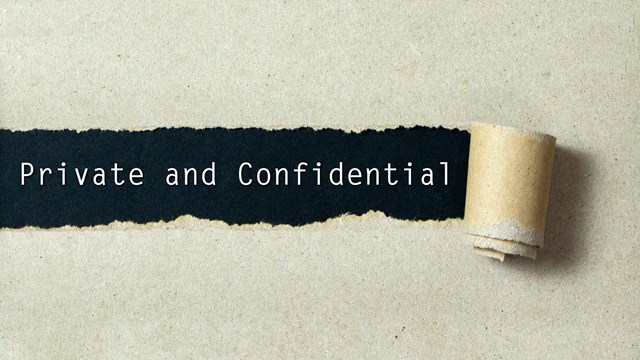
The issue of intellectual property and an individual’s right to privacy has become a greater concern since more and more people conduct their lives online—whether for banking, social media or dating. While the aforementioned generally have security features encrypted in programming platforms, there remain justified concerns as to what is actually protected. This heightened sense of scrutiny results in ancillary privacy concerns, especially for those living in community associations.
Whether it is the installation of security cameras, insider criminal activity or environmental health concerns, both boards and residents have to be aware of state laws and governing documents. Cases of privacy intrusion happen from coast to coast. Last year, for example, a Florida family living in a penthouse suite sued its condominium association for cell phone towers that were installed on their roof without permission causing loud noises and health risks. In Hawaii, a security guard was arrested for copying residents’ keys and stealing credit card and banking information.
“Giving a general overview of the security measures, data or physical, of a property so residents know there are safeguards in place to protect them should help ease concerns,” says Sean Jordan, CMCA, AMS, vice president and portfolio manager for the Canton, Massachusetts-based The Niles Company. “You are trusted with managing people’s homes; trust in your management team and board members is essential.”
Understanding Privacy
Under Massachusetts General Laws, according to the Massachusetts Privacy Act, M.G.L. c.214, section 1B, “a person shall have a right against unreasonable, substantial or serious interference with his privacy.” Clive Martin, an attorney with the Boston-based law firm of Robinson & Cole says, “There are also federal and state electronic records laws, health privacy laws, laws regulating what information may be released by the government and by employers and laws regarding the unauthorized use of a person’s name or image,” he adds. “These all control different aspects of personal privacy.”
For a board, a grey area exists with regard to privacy when forming (or amending) governing documents such as determining access to units. “There aren’t condominium- or co-op-specific statutes with addressing privacy for multi-family dwellings. Obviously an association is bound to follow the procedures put forth in their documents, which might include special times when the association has access to a unit or a certain amount of notice that must be given in advance,” says Attorney Gary Daddario, a partner in the Westford, Massachusetts-based law firm of Perkins & Anctil, P.C. “When it comes to privacy issues, the co-ops and the condos are looking at the same statutory provisions used for any other type of property.”
Martin says the basic rule for boards to remember is that a person has a reasonable expectation of privacy within his or her living space. This begs the question: What is a “living space” in a condominium? Does it include the common areas? “By taking title to their unit, condo owners become subject to the governing documents of their condominium; these docs may reduce the privacy an owner of real estate might otherwise expect,” says Martin.
Regulations under the Data Privacy Law, 201 CMR 17.00, state that any person who “owns” personal information in connection with the provision of goods or services about a Massachusetts resident, including first name and last name or first initial and last name in combination with any one or more of the following data elements: Social Security number, driver’s license number or state-issued identification card number, can be held accountable. Additionally, financial accounts such as credit or debit card numbers must safeguarded with appropriate administrative, technical and physical measures.
The Commonwealth of Massachusetts’ Consumer Affairs and Business Regulation Department states that these regulations apply “to those engaged in commerce,” but also applies to those who collect personal information “in connection with the provision of goods and services.” Therefore, it is unclear if a condominium provides services under this regulation.
“The prudent approach for any condominium that finds itself with the social security numbers, credit card numbers or driver’s license numbers of its residents is to act in compliance with the regulation,” says Martin. “Protections required by the regulation can be onerous and include the requirement of secure systems, regular monitoring, periodic review, development of written security policies and encryption of data.” This issue can affect boards if they collect financial information for facility membership or payment for monthly fees.
Who is Watching Whom?
While it is plausible and common for boards to grant reasonable access to a unit for maintenance reasons, there are issues that can cause trepidation for tenants and residents alike, even if their respective best interests, or that of the community, are guiding the motion. One example is security cameras, the installation of which normally doesn’t require notification, even if a third-party vendor is overseeing the operation.
“Regarding cameras, the association is governed by its documents. If it is within the board’s authority to make changes in the common area and they are added security to the property there shouldn’t be an issue,” says Jordan. “I feel it helps to inform and discuss such changes, though, with residents and ask for feedback. People want to be part of their community and feel that their opinion is heard. And sometimes, people suggest some very good ideas that maybe weren’t considered.”
Daddario adds that the addition of security cameras is commonplace and the only way in which residents would be able to voice their concerns over it, is if it’s considered a capital improvement for which the board must notify the community for a vote. “Most of the time security cameras are considered a capital improvement, so residents have an opportunity to be heard,” he says.
In some cases, boards will require that all guests and service personnel sign in and out when visiting the building. While this, again, is commonplace in many buildings, concerned parties are sometimes wary of why this information is needed. “The association and the board are governed by their condo docs and rules and regulations,” says Jordan. “I do have associations that have sign-in procedures for guests as well as vendors. It helps track traffic in the community and also can be referenced in the event of an emergency.”
Along with daily visitors, many boards will also limit the number of days or weeks that a resident can host a guest. In the situation where a unit owner rents or subleases his unit, Daddario explains that state law requires the owner to provide the board with renter information. “There are legitimate reasons for boards to ask who is in the building. If it is visitor or a vendor, they need to be able to alert the fire department as to how many people were on the property in the event of an emergency,” he says. “There is a provision in the Massachusetts Condominium Statute that requires to the extent that a unit owner is going to rent the premises, they are required to inform the association as to the identity of the tenants that will occupy the unit.”
Overstepping Boundaries
As long as boards adhere to state statutes, they are able to make as many security-based or privacy enhancements as desired. While these amendments require a community vote, most often they are done with safety in mind; however, there are some instances that may cross the line including publicly posting the names of unit owners who haven’t paid dues.
“If there’s a super-majority vote by the owners to adopt an amendment of the condo docs with far-reaching security changes, it would likely be lawful unless it is clearly discriminatory,” says Martin. “For example, if only certain ethnic groups are subject to signing-in and out, or if only minority-owned units are subject to entry by the board on one pretext or another, that is likely not appropriate. But as a practical matter, only when a member of the discriminated minority sues would the matter ever come to a court’s attention.” Until a lawsuit is brought forth, Martin adds it’s not so much being “okay” as “unchallenged.”
Jordan explains that when serious privacy issues arise, he acts as the first line of defense in hopes of mediating the problem. “Part of your job as a manager is to assist the board of trustees in protecting the association. This also includes informing them of actions that may lead to legal challenge,” he says. “If something is questionable, it’s best to seek the advice of the association’s attorney.”
It’s not common that privacy issues make it to court, as there are ways in which community members can address the board in hopes of mediation or reversing the rule in question. “Going to court is a tough row to hoe,” says Daddario. “To the extent a unit owner felt that something was wrong, they have various options. One is to petition the board to change if it’s a provision of the condominium documents. If that doesn’t work they can petition the community or they always have the option of getting elected to the board and effectuating change that way.”
If the resident is bent on going to court because he or she feels that the board deliberately violated legally protected privacies, they have recourse. “There are common law causes of action in tort for intrusion upon person’s seclusion, publicizing private matters, putting a person in a false light and appropriating someone’s name or likeness,” says Martin. “In addition, the Massachusetts Privacy Act allows the Superior Court to award equitable relief and/or money damages if the court finds that the invasion of privacy is unreasonable and either substantial or serious.”
Balancing privacy and security in a condominium setting is a balancing act that boards and managers must take very seriously. However, when done properly, residents can be safe and secure in their own homes and in the knowledge that their investment is well-protected.
W. B. King is a freelance writer and a frequent contributor to New England Condominium.









Leave a Comment